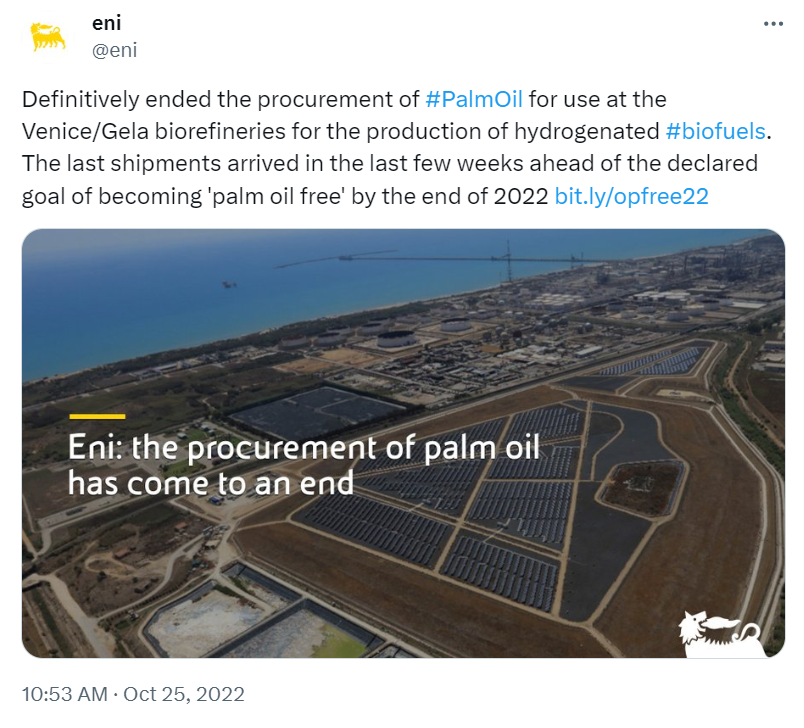The Italian oil giant ENI is still importing palm oil products despite its pledge to become “palm oil free”, a new Transport & Environment (T&E) investigation shows. T&E found that at least eight vessels were carrying PFAD – a byproduct of palm oil production – from Indonesia to Italy to be turned into biodiesel[1]. T&E calls on ENI to end use of all deforestation-driving palm products to avoid misleading shareholders and consumers.
In 2020, ENI was fined €5 mn for deceiving consumers over its misleading ‘green diesel’ advertisements. Italian regulators pointed to the fact that CO2 savings were undermined by the negative effects of deforestation associated with palm oil. Subsequently, ENI pledged to end its use of palm by the end of 2022.

The company’s commitments and transparency towards its shareholders and the general public are ambiguous. Despite the oil major’s commitments to stop using PFAD alongside crude palm oil, ‘in’ and ‘by’ 2023, its Gela and Venice refineries are still relying on PFADs, the company has confirmed. Meanwhile, Eni has put a strong emphasis in its communication on replacing crude palm oil with only “sustainable raw materials.”
While the industry likes to consider these as residues and wastes, scientific studies show that PFADs are in fact a key part of the palm oil value chain. Research has shown that PFADs are worse for the climate than fossil diesel and not much better than crude palm.
Agathe Bounfour, oil program lead at T&E, said: “Studies show that the use of PFADs results in more deforestation and more emissions, all in the name of so-called sustainable biofuels. ENI should end use of all palm products to avoid misleading investors and consumers.”
In one example, on 13 June 2023, a tanker ship called the Loevstakken departed from the east side of Kalimantan Island, Indonesia, before heading to Balikpapan, a port city on the island of Borneo. The boat appears to have loaded several shipments of PFAD supplied from subsidiaries of international palm oil producers such as Louis Dreyfus and Wilmar. The ship would eventually reach Eni’s refinery around 24 July.
All the ships investigated by T&E followed a similar pattern, starting with several stops at Indonesian ports before crossing the Suez canal towards Eni’s Gela refineries. Some ships also stopped in Malaysia, where potentially more palm products were loaded onto the ships.
Agathe Bounfour concluded: “Biofuels are central to the Meloni government’s pushback against a Europe-wide ban on new petrol and diesel cars. This investigation’s findings should ring serious alarm bells. ”
ENDS
Notes to editor
[1] T&E identified eight boats carrying PFAD between 1 January and November 2023 carrying palm oil products. For full details see investigation methodology.


